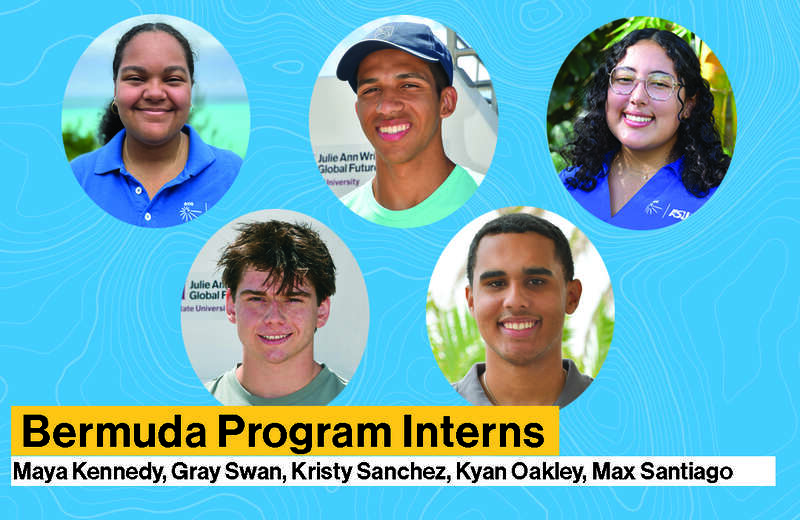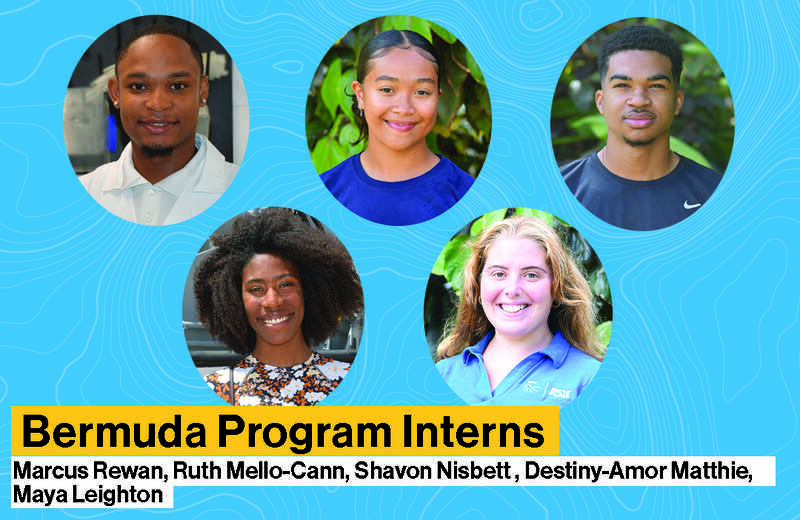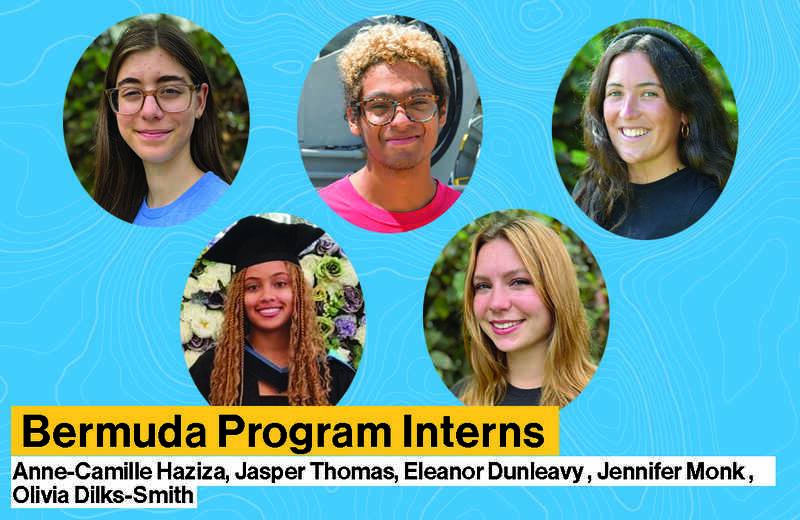15 Students Selected For ASU BIOS Internships
ASU BIOS welcomed 15 Bermudian students as Bermuda Program interns for the 2024 session, offering them hands-on research experience in marine and atmospheric sciences.
A spokesperson said, “Each year, a select group of Bermudian students are chosen to participate in the ASU Bermuda Institute of Ocean Sciences [ASU BIOS], a unit of the Julie Ann Wrigley Global Futures Laboratory at Arizona State University, Bermuda Program, which offers an exceptional opportunity for students to work alongside top experts in marine and atmospheric sciences. This summer, ASU BIOS is excited to announce the arrival of 15 Bermuda Program Interns for the 2024 session.
“The new cohort of research interns brings with them a diverse array of skills and academic backgrounds to ASU BIOS. While on campus, the interns will learn first-hand about the Institute’s mission to produce high-impact research while fostering the next generation of environmentalists. Established in 1976, the Bermuda Program allows local students to expand their knowledge by working on specific projects of interest with ASU BIOS scientists in both field and laboratory settings. During this paid fellowship participants work full-time for four to eight weeks throughout the summer and must present their research at the end of their internship in an academic seminar with their peers and fellow mentors. This novel opportunity provides valuable real-life experience for students at the beginning of their scientific careers.
“The 2024 Bermuda Program Interns:
Olivia Dilks-Smith:
- “20, third-year student in Chemistry at the University of Southampton [United Kingdom]
- “First-year Bermuda Program Intern
- “Mentor: Rachel Parsons [ASU BIOS]
- “Project: “My project is focused on monitoring the nitrogen cycle within oxygen minimum zones such as those found at Devil’s Hole.”
- “My aims and goals for the internship are to experience first-hand where my chemistry skills, which I have developed over the course of my degree, can be utilised as well as gaining experience and knowledge to take back for my third year of university.”
Eleanor Dunleavy:
- “22, recent graduate in Biology from the University of Western Ontario [Canada] and will start her MSc in Biology at McGill University [Canada] in the fall.
- “Third-year Bermuda Program Intern, also attended Tropical Marine Ecology Summer Course [2023] and Research Diving Methods Summer Course [2024]
- “Mentor: Dr. Samia Sarkis [Living Reefs Foundation]
- “Project: “I am conducting coral reef biodiversity surveys to determine the dominance of soft corals compared to hard corals. The project aims to measure abundance and species richness of corals and fish, which can be used to create an index to quantitatively compare biodiversity at two coral reef locations.”
- “My goal for this internship is to further research into the health of Bermuda’s coral reef ecosystem. I hope to be able to gather data that can continue to be integrated into long-term monitoring programs that allow us to track Bermuda’s reef health over time, with the changing global climate. I’m excited to become familiar with coral restoration methods utilised at the Living Reefs Foundation.”
Anne-Camille Haziza:
- “16, student at Bermuda High School [Bermuda]
- “First-year Bermuda Program Intern, also attended Innovations for the Environment Program [2022, 2023]
- “Mentor: Hannah Gossner [ASU BIOS]
- “Project: “I am working with Dr. Leocadio Blanco Bercial and Dr. Amy Maas on a project using UVP 6 [underwater vision profiler] data to analyse particle images and determine their vertical distribution at the Bermuda Atlantic Time-series Study [BATS]. We are processing data spanning 1.5 years to study the impact of seasonal changes on the vertical flux of carbon, through varying particle sizes.”
- “Through this internship, I hope to enhance my data analysis and interpretation skills, while also deepening my understanding of how research is conducted and presented. Moreover, an important aspect of this internship is the collaborative work with experienced scientists.”
Maya Kennedy:
- “19, second-year student at the University of Guelph [Ontario, Canada]
- “First-year Bermuda Program Intern
- “Mentor: Tarik Smith [Koom Consulting]
- “Program: “During my internship, I worked on the First Flush Project with Tarik Smith from Koom Consulting. We worked on a continuation of testing a first flush diverter prototype at the Department of Corrections farm facility. The first flush diverter is a device that is attached to a building downpipe that diverts the water collected from the roof with the most built-up sediment and debris after a dry period. I tested the first flush diverter by collecting and testing water samples from the two chambers of the diverter to determine the removal efficiency of the diverter.”
- “My goals for this internship were to learn as much as I could about working in a science field and to learn more about water quality research. Also, to gain experience working in a science field.”
Maya Leighton:
- “21, student in Oceanography and Applied Mathematics at the University of North Carolina Wilmington [USA]
- “Fourth-year Bermuda Program Intern, also attended Ocean Academy Saturday Intern Program [2020]
- “Mentor: Rachel Parsons [ASU BIOS]
- “Project: “This year, my project focused on the Devil’s Hole time-series. I’m looking at long-term sea surface trends as well as bacterial abundance and microbial processes at the oxygen minimum zones and how this all relates to ocean deoxygenation and climate change. I also joined the BATS Validation 2024 research cruise from Bermuda to Puerto Rico, assisting the BATS team and sampling for microplastics to observe the microbial community along the Bermuda-Puerto Rico transect. I’ve also wrapped up a project studying the Sargasso Sea’s microbiome.”
- “My goal is always to learn and grow as a scientist. Every year that I return to ASU BIOS, I learn something new, whether it’s a scientific skill like presenting or writing or data analysis, a new protocol or method, or just information from research. I think that’s what makes this program so valuable!”
Destiny-Amor Matthie:
- “19, student at the University of Plymouth [United Kingdom]
- “Third-year Bermuda Program Intern, and has previously participated in the Marine Science Internship and Research Diving Methods Summer Course
- “Mentor: Dr. Robbie Smith [Bermuda Aquarium, Museum & Zoo]
- “Project: “We are currently working on research branched off from the BREAM project. Although each intern has a different focus for the final results, the overall research involves annually conducting multiple fish surveys – via transects – at various coastal and patch reef sites around Bermuda.”
- “Last year, I participated in this research with Dr. Robbie Smith and ended my internship focusing on three Serranidae [grouper] species, highlighting their juvenile and adult presence and abundance. This year, I hope to expand my research to provide a more thorough picture of Serranid population patterns around our island. This internship has significantly increased my confidence in reef fish identification and fieldwork planning and execution. I hope to gain more experience in underwater photography/videography and continue to expand my skill set whilst enjoying snorkelling. The people, environment and experience are truly worth returning for.”
Ruth Mello-Cann:
- “19, third-year student at Brigham Young University [Utah, USA]
- “Second-year Bermuda Program Intern
- “Mentor: Chloe Carbonne, PhD [ASU BIOS]
- “Project: “The general idea of my project is to explore the benefits of artificial upwelling on the physiology of corals under marine heatwaves, specifically focusing on photosynthesis and respiration.”
- “My aims and goals for this internship are to learn more about work in the field in relation to marine research. I also want to gain more connections and learn more about what I can do now and, in the future, to achieve my aspirations.”
Jennifer Monk:
- “20, recent graduate from the University of Nottingham [United Kingdom], and will be pursuing her Master’s degree at the University of Bath [United Kingdom] in the fall
- “Second-year Bermuda Program Intern, and attended AU-Coral Project [2023]
- “Mentor: Chloe Carbonne, PhD [ASU BIOS]
- “Project: “I will be working on the Artificial Upwelling [AU] Coral Project, studying the benefits of artificial upwelling on coral physiology during heatwaves. I will be working alongside Ruth Mello-Cann to analyse data on photosystem II health, bleaching, respiration, photosynthesis and calcification. I will be there until the end of the experiments allowing me to begin processing the tissues of the corals.”
- “My personal goals for the internship are to gain hands-on experience with research techniques and improve my data analysis skills. I want to collaborate with the research team to make meaningful progress in combating the effects of marine warming on our fragile coral reefs. I also want to take the time to build connections with new people across the ASU BIOS family.”
Shavon Nisbett:
- “19, first-year student at Nova Southeastern University [Florida, USA]
- “Second-year Bermuda Program Intern
- “Mentor: Dr. Rod Johnson [ASU BIOS]
- “Project: “The project I will be working on is called “The role of bacteria in Bermuda’s Ocean Biological Pump.”
- “My aim is to continue to explore the different areas in the marine science field and build a foundation in preparation for university.”
Kyan Oakley:
- “17, Senior in high school at Northfield Mount Hermon [Massachusetts, USA]
- “First-year Bermuda Program Intern, also attended Innovations for the Environment Program
- “Mentor: Dr. Tim Noyes [ASU BIOS]
- “Project: “I am working on two projects. First, I am making an artificial intelligence program to automatically identify different deep sea fish species from Tim Noyes’ Baited Remote Underwater Video systems [BRUVs] films. My second project is a mechanism to autonomously activate a Niskin when it hits the bottom of the sea to collect deep sea samples without needing a messenger line.”
- “I aim to get real-world experience with realistic problems and use my engineering mind-set to help solve these problems.”
Marcus Rewan:
- “22, first-year student at Lynn University [Florida, USA]
- “Third-year Bermuda Program Intern
- “Mentor: Rachel Parsons [ASU BIOS]
- “Project: “My project analyses the correlation between sea surface temperature and bacterial abundance across the Bermuda platform.”
- “My goal was to improve my scientific writing skills and learn new protocols.”
Kristy Sanchez:
- “20, student in Biology at McGill University [Montreal, Canada]
- “Third-year Bermuda Program Intern
- “Mentor: Rachel Parsons [ASU BIOS]
- “Project: “My project is a preliminary look at the microbiome of Sargassum, an ecologically important macroalgae after which the Sargasso Sea is named. I began by optimising a protocol to remove the microbiome from Sargassum. I then studied the difference between the microbiomes of three of the most common Sargassum morphotypes in Bermuda. In the final weeks of my internship, I ran an incubation experiment where I simulated decay of Sargassum by washing up inshore and I have been sampling its microbiome over time to see if bacterial abundance and some other factors change as Sargassum declines in health.”
- “My goal for this internship was to gain as much field experience as possible. I’ve learned a lot in university about field work and data collection and I wanted to be able to apply those skills to my own Bermuda Program project. I am happy to say I was very successful in that goal as I was able to participate in multiple sampling trips, both for my experiment but also for long-standing ASU BIOS projects and with visiting scientists. I learned to identify Sargassum morphotypes in the field and created my own protocol for field sampling Sargassum for the purpose of microbial analysis.”
Max Santiago:
- “19, second-year student at Purdue University [Indiana, USA]
- “First-year Bermuda Program Intern
- “Mentor: Dr. Mark Guishard [ASU BIOS]
- “Project: “My project is about modelling hurricane intensity due to projected future sea surface temperatures.”
- “My aims and goals include learning how to do research, becoming more proficient in Python, understanding how hurricanes work, and learning more about meteorology as a career.”
Gray Swan:
- “18, first-year student at the University of Kentucky [USA]
- “First-year Bermuda Program Intern, and attended Marine Science Internship [2022]
- “Mentor: Dr. Tim Noyes [ASU BIOS]
- “Project: “My project is about creating different options for floatation devices and rigs that can be used for deep sea exploration.”
- “My goal is to become more comfortable in a working environment like ASU BIOS and gain experience that will help me at university.”
Jasper Thomas:
- “21, student in Marine Biology with a certificate in Geographic Information Sciences at Dalhousie University [Nova Scotia, Canada]
- “Fifth-year Bermuda Program Intern, and attended Marine Science Internship [2019]
- “Mentor: Dr. Robbie Smith [Bermuda Aquarium, Museum & Zoo]
- “Project: “Our project focuses on the distribution and diversity of fishes primarily around Bermuda’s nearshore and inshore areas and is a follow-up to the BREAM project done by Dr. Robbie Smith and Thaddeus Murdoc.”
- “Our main goal is to compile the data and determine if there are any significant changes in the distribution of different fishes. These include comparing over periods of time and comparing between different locations. My personal goal is to use geographic information systems to create maps of certain target fish groups [e.g. parrotfish, groupers] to visualise on maps where their hotspots are, as well as their overall abundance and density.”
“For more information on the ASU BIOS Bermuda Program please click here.”





